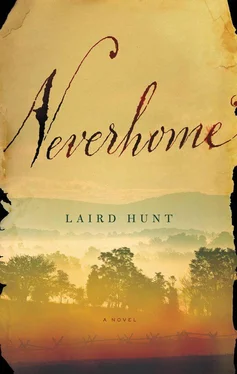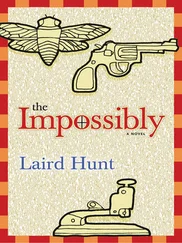“Stealing wasn’t my central transgression.”
“Then you do admit to it.”
“I would like to go home. I would go straight home if I were let to leave. I would like to write a letter to my husband. He would come and fetch me. I know they release people out of here to their families. I never stole. Or betrayed.”
The Colonel stood and put a hand on my shoulder.
“You need to wear more and better, Gallant Ash. I’ll see to it that you get something else to wear. Your dress is too thin. It won’t do for this cold weather. You should change clothes.”
I started to stand but he told me to sit by the fire a few more minutes.
“We must not let this war deprive us of all comforts,” he said. He bent and picked up the vase and set it back on the table. I watched his back, then turned and saw that he had left behind a letter for me.
“My Dearest Constance,” it read.
I write you with your former name because I have grown afraid that you are no longer with us but have gone away far from this earth and its trials and its cares. It seems to me in such sad possible circumstance that I must write to you as you are and not as you seem if this letter and thought is to have any hope of reaching you. I am well, dear one, but my troubles here, previously described, continue: Now they have burned the seed shed and taken off both our mules. They want our land and continue their depredations and worsen it with talk of paving the way for the forces of the rebellion that must come. Secessionists in our midst. If I hadn’t heard it from their own mouths I wouldn’t have credited it. But I keep the old musket handy and walk vigilant as you would and, though they are strong, hope still to gain the upper hand. And hope too, even if I cannot prevail, to otherwise see things through. I pray that wherever you are, war or no war, this will reach you and send you, all past troubles put behind us, sailing back to me.
I did sail home to my Bartholomew. That very night in a dream I went rushing over the treetops, along the rivers, through the chill of the mountains, spiriting north and west through snow and thunderstorm and into a white sun. I found the house burned to the ground and Bartholomew run off far away. In his place were old and evil men sharpening their plows and planning to set our good oxen to the yoke and, to the tune of “Dixie” made it worse, gobble everything up.
It was these same men had burned our neighbor out those years before and so my mother came into the dream and stood in the center of the cinders of our house, which had been her house, and wept. The tears of my mother must have found a way out of the dream and onto my face because when I woke there they were. Hot and heavy ghosts come to haunt my face. I roared and raged then. I beat my hand and head on the door until both were bloody.
“I must go home,” I yelled. “You must let me leave.”
It was the keeper gave me my answer. She came in hard with two buckets had ice floating on their tops. February or not, she turned them both over me. She came at me with her foot a minute later as I lay gasping and shivering, and I caught it and twisted and threw her down. The others around me laughed and cheered as I put my fists to the keeper’s face. The guard came into it and I worked on him too.
“I will fight you all until you let me leave,” I said. Around me the ladies howled. One of them picked up the guard’s slouch hat and did a march around the cell. When the keeper tried to get up I put my foot on her neck. It took another guard running down the hall and hitting me on the back of the head with his rifle butt to stop me.

I had many an occasion to dream about home in the long hours afterward when I woke and found they had put me in the chair. I spent two days on its rough planks with the brimmed bucket on my head, and when they untied me, I took up a candlestick and hit the doctor had finally come to visit in the face with it, so they gave me three more. A fever found me that second suite of days. To this fever I attribute the fact that although I sat in that chair the whole time, it felt to me like I was able to stand up out of myself and walk down the corridors of the madhouse and out the door and across the burning countryside. I saw soldiers at their cards or guns as I walked; I saw cannon sitting black in its iron; I saw mules and horses hadn’t eaten in days hollering out in Latin for their feed. I tried one of these times to walk home but the rivers grew wide and deep and the forest grew dark and thick. I turned back to the battle then. The world was afire with it. I looked everywhere for a gun but couldn’t find one. The dead spoke to me on those walks. With mouths that floated above their own bodies with the flies. They clambered up to the rafters of barns and yelled down at me from the treetops, dangled by their knees from the clouds. On one misty field an army of cats had come out to lick the corpses. The cats walked upright and carried colored banners. When I got up close to them they all turned at the same time and looked at me so I ran. Running, I found my way to a fight. The fighters had gotten their coats all mixed up and just stood in a mess trying to figure out which way they needed to turn their guns. “Tell us a story so we’ll know which way to shoot,” they said. They handed me a flower. I took it and put it between my teeth, then pointed to the steeple of a nearby church.
In between these excursions, I would come back to the chair and the bucket with its brim. There was attendants who would come along every now and again to hit the side of the bucket with a hand or poke me sharp in the ribs with a stick. They kicked me too and tightened my cords and whispered that they hoped I wouldn’t wake up any longer, that they could toss me into the field nearby when I was done. They were doing that on one of my bucket walks. Carrying the blackened carcasses out to pile up in a field. I helped in the chore. Laughed until my teeth fell out. Felt the ache in me everywhere, as the job never seemed to get done. So that when after three days my keepers untied me and drenched me down with water and scrubbed me off, I hurt on every square inch of my body and did not have the strength to fight. I lay sick to dying for two weeks afterward. Puddle of arms and legs, bits of burning skin. I kept hoping I would travel out again, even if it was just to pile corpses, but it couldn’t be done. It was into March before I was sitting up against the brick wall and eating the blows they fed us again.
I do not like much to think of the days that followed. When the keeper came at me I cringed and cried. When the doctor peeped in and asked me my name I told him one I had heard in a dream. I told him that I was a runaway from Chattanooga. That I had spied for the forces of the rebellion. That I had handed over secrets had led to the death of ten thousand men. The two women had once been heavy saw an advantage during these days and stole my food. The ones against the wall hollered at me and shook their chains. The women who wrung their hands looked on and shook their heads.
I cringed and groveled and scraped and moaned. The keeper smiled a gummy smile and said it was the chair had changed me. She said sometimes it took a while but that they all eventually changed. She wouldn’t hold my fists and feet against me. She’d had worse. She had known a gal had thought she had invisible arms growing out of her neck had come after her with a broken bottle and cut her three times. That gal had spent one month and two days in the chair and had been cured without a trace of her previous ailment. Had never spoke of it again. All the ones chained to the wall had taken their turns in the chair and had quieted considerably after it. There was others, she said, looking around at the rest of the cohort, that could stand to try the cure.
Читать дальше













